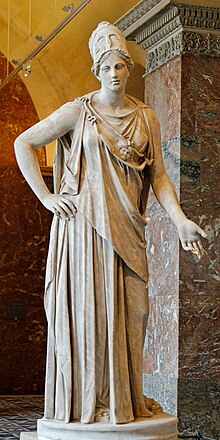Pallas Athene
| Athena | |
|---|---|
| Goddess of wisdom, craft, war, diplomacy, weaving, poetry, medicine, and commerce | |

Mattei Athena at Louvre. Roman copy from the 1st century BC/AD after a Greek original of the 4th century BC, attributed to Cephisodotos or Euphranor.
|
|
| Abode | Mount Olympus |
| Symbol | Owls, olive trees, snakes, Aegis, armour, helmets, spears, Gorgoneion |
| Personal Information | |
| Parents | Metis and Zeus |
| Siblings | Aeacus, Angelos, Aphrodite, Apollo, Ares, Artemis, Dionysus, Eileithyia, Enyo, Eris, Ersa, Hebe, Helen of Troy, Hephaestus, Heracles, Hermes, Minos, Pandia, Persephone, Perseus, Rhadamanthus, the Graces, the Horae, the Litae, the Muses, the Moirai |
| Roman equivalent | Minerva |
Athena (/əˈθiːnə/; Attic Greek: Ἀθηνᾶ, Athēnā, or Ἀθηναία, Athēnaia; Epic: Ἀθηναίη, Athēnaiē; Doric: Ἀθάνα, Athānā) or Athene (/əˈθiːniː/; Ionic: Ἀθήνη, Athēnē), often given the epithet Pallas (/ˈpæləs/; Παλλὰς), is the goddess of wisdom, craft, and war in ancient Greek religion and mythology. In later times, Athena was syncretized with the Roman goddess Minerva. Athena was portrayed as having a calm temperament, and moving slowly to anger. She was believed to only fight for just causes and never fight without a purpose.
In ancient Greek literature, Athena is portrayed as the astute companion of heroes and as the patron goddess of heroic endeavour. She is also the patroness of Athens. The Athenians constructed the Parthenon atop their Acropolis as a temple to Athena; it takes its name from her epithet Parthenos, which means "Virgin".
...
Wikipedia
